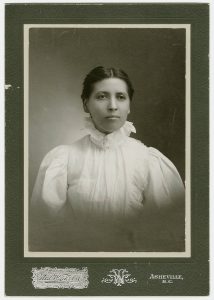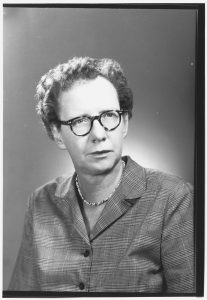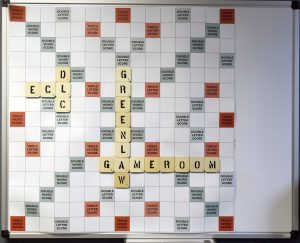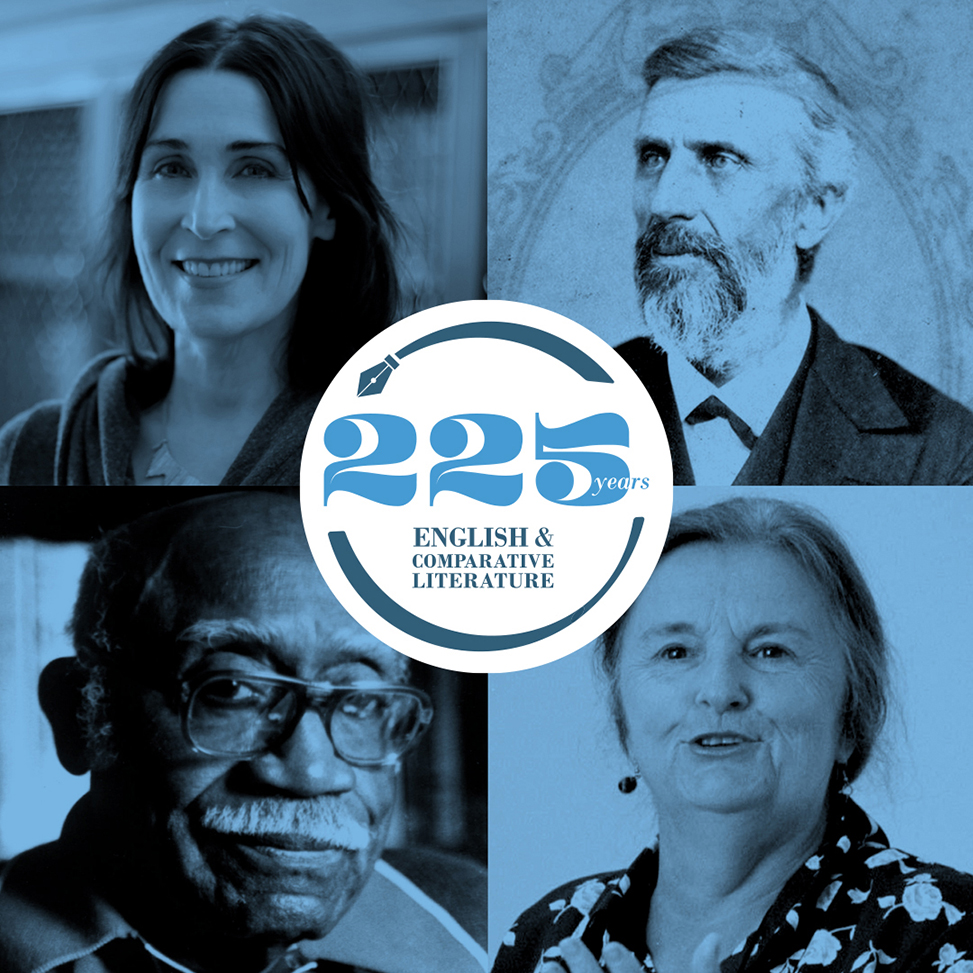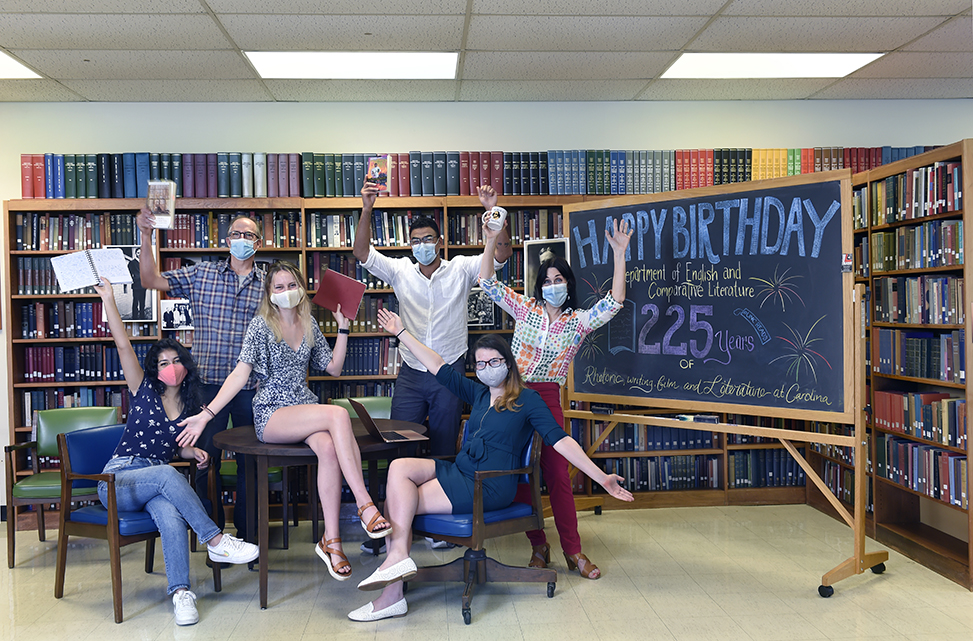
The department of English and comparative literature celebrates 225 years of rhetoric, writing, film and literature at UNC-Chapel Hill in October. The department ties its history to the founding of the University.
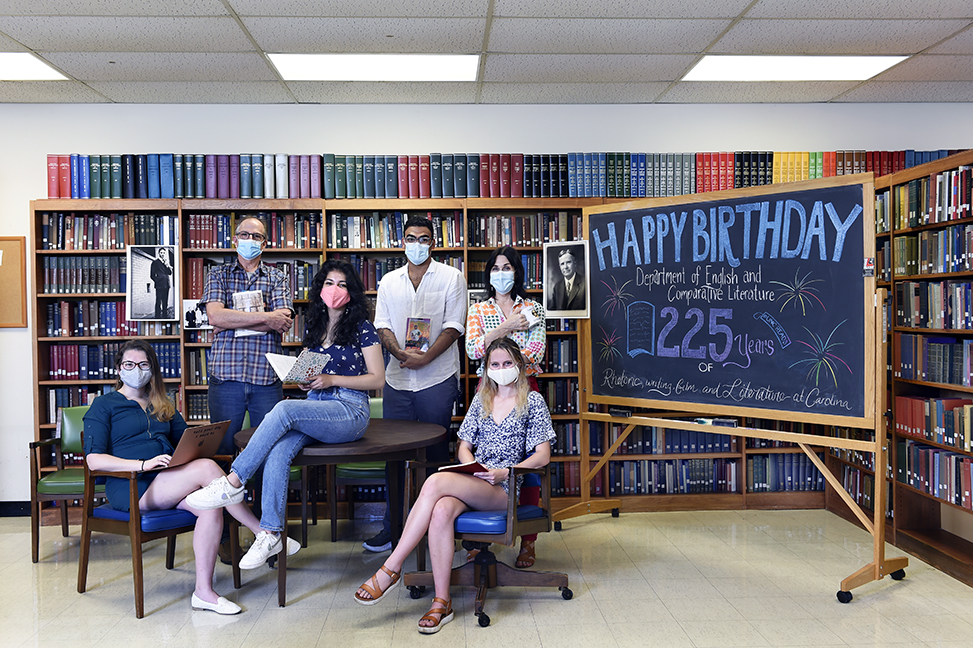 Celebrating a major milestone — sitting, from left: Ph.D. student Hannah Montgomery and undergraduate students Luisa Peñaflor (Thomas Wolfe Scholar) and Hanna Tischer. Standing, from left: creative writing program director Daniel Wallace, assistant professor of creative writing Gabriel Bump and department chair Mary Floyd-Wilson. (Photo by Donn Young; Illustration by Audrey Dingler)
Celebrating a major milestone — sitting, from left: Ph.D. student Hannah Montgomery and undergraduate students Luisa Peñaflor (Thomas Wolfe Scholar) and Hanna Tischer. Standing, from left: creative writing program director Daniel Wallace, assistant professor of creative writing Gabriel Bump and department chair Mary Floyd-Wilson. (Photo by Donn Young; Illustration by Audrey Dingler)
Carolina alumna Mandy Eidson raises money to support affordable housing projects in her home state of Georgia. She says her 2014 English degree is critical to the work she does today.
“It strengthened my writing and critical thinking skills, which has enabled me to become a more effective communicator about social issues,” said Eidson, senior manager of the Atlanta Neighborhood Development Partnership Loan Fund. “Knowing how to effectively tailor your message for specific audiences is crucial and has ultimately made me more successful in garnering support for these projects.”
At Carolina, she took classes in everything from Shakespeare to American poetry to nature writing. She studied abroad at Oxford University through the Pauline Brooks and Christopher Armitage Scholarship. Her 2013 Summer Research Fellowship explored how writers Henry David Thoreau and William Wordsworth advocated for their native watersheds in response to environmental impacts from railroads and other development.
Eidson went on to pursue a master’s degree in urban studies through the European Union’s Erasmus Mundus program, studying at six European universities in Brussels, Vienna, Copenhagen and Madrid.
She recently spoke at a panel on “What Does it Mean to be an English and Comparative Literature Major Today?” Since September, the department of English and comparative literature has been celebrating “225 years of rhetoric, writing, film and literature” through a series of virtual events, which will conclude Oct. 27-29. (For more information, visit ecl225.unc.edu.) The department ties its history to the founding of the University in 1795, when rhetoric and composition were first taught, but birthday festivities were delayed a year due to the pandemic.
Hilary Lithgow, teaching associate professor of English and an undergraduate adviser to English majors, invited Eidson to speak. As she is fond of telling students and their parents: “There is nothing old-fashioned about being able to communicate clearly.”
It’s a skill that will help students be professionally successful “whether they are composing poems or policy briefs or legal arguments or medical reports or grant proposals or elevator pitches for a new startup or any other kind of communication they may need to craft,” Lithgow said.
Early days and milestone moments
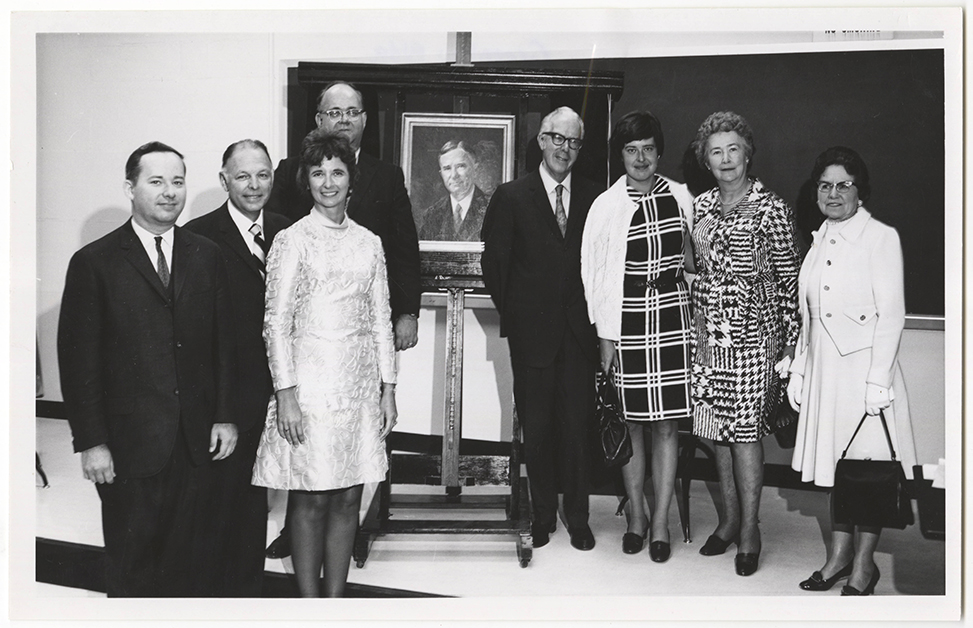 Family members of the late Edwin Greenlaw and University officials gather at the dedication of Greenlaw Hall in 1970. (photo courtesy of North Carolina Collection Photographic Archives, University Libraries)
Family members of the late Edwin Greenlaw and University officials gather at the dedication of Greenlaw Hall in 1970. (photo courtesy of North Carolina Collection Photographic Archives, University Libraries)
Even though rhetoric and composition were taught in the University’s earliest days, it wasn’t until 1849 that the first professor of English literature and history was appointed. In 1875 (when the University reopened after being closed for Reconstruction), a College of Literature was formed; in 1901, the department of English was formally established. In 1901, the undergraduate catalog advertised 14 courses in English; today there are over 300.
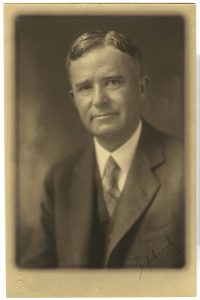 The department began to take on its modern form under the leadership of Edwin Greenlaw (pictured at right), who was appointed chair in 1914. (Greenlaw Hall, the English department’s current home, was dedicated in 1970.) In 2006, the department merged with the curriculum in comparative literature to become the department of English and comparative literature.
The department began to take on its modern form under the leadership of Edwin Greenlaw (pictured at right), who was appointed chair in 1914. (Greenlaw Hall, the English department’s current home, was dedicated in 1970.) In 2006, the department merged with the curriculum in comparative literature to become the department of English and comparative literature.
“Literature was taught in Latin and Greek in the very beginning, but students also had to turn in a composition to the presiding professor every two weeks,” said Erika Lindemann, professor of English emerita. She got her UNC master’s and doctorate degrees in English in 1969 and 1972, respectively, and became director of composition in 1980. She went on to write a seminal book, A Rhetoric for Writing Teachers, in 1982.
Just as students today often dread turning in that final English paper, students in the 1840s shared a similar writing phobia, as recounted in a journal entry of one student, James L. Dusenbery of Lexington, North Carolina. Lindemann has worked on several digital humanities projects about the University’s history, including a project on Dusenbery’s senior year at Carolina.
He wrote on Oct. 10, 1841:
“I have done nothing as yet towards writing a (senior) speech … To write a speech for the first time & one too that is to be spoken before an intellectual & severely critical assembly, is, to me, a task of fearful magnitude & startling responsibility.”
Lindemann, who confesses that she “loves digging around in the archives,” worked with English Ph.D. students Hannah Montgomery and Grant Glass and teaching associate professor Courtney Rivard to develop a comprehensive timeline of the department’s history. (See our abbreviated version below; visit the full timeline).
Lindemann and Montgomery were struck by how many ideas — some that became full-fledged departments and entities of their own — were incubated in the English department. Dramatic art, women’s and gender studies, African and African American studies, journalism and even the Bulls Head Bookshop were all tied to interests of the department’s professors and students.
“That freedom to explore whatever corollary interest you have is still very present today,” Montgomery said. She has worked with the department’s Digital Literacy and Communications Lab for several years and is involved with the Comparative Literature and English Association of Graduate Students. “One example of that would be the new Greenlaw Gameroom for faculty who want to incorporate gaming pedagogy into their teaching and research.”
Organic evolution
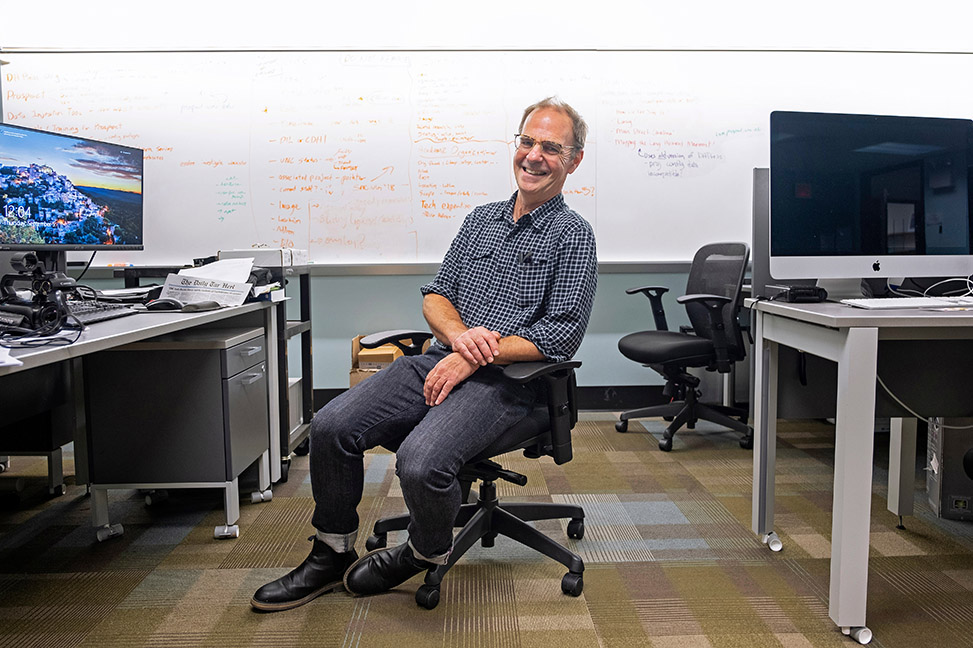 Daniel Anderson, director of the Writing Program, is a leading voice in digital scholarship. (photo by Jon Gardiner)
Daniel Anderson, director of the Writing Program, is a leading voice in digital scholarship. (photo by Jon Gardiner)
Daniel Anderson, professor and director of the Writing Program, calls Lindemann “a foundational figure in writing instruction.” He said Lindemann and others have helped to develop English 105, a required first-year writing course that introduces students to academic writing across the disciplines, into what it is today. Each course has some sort of digital component. English 105i, a more specialized course, allows for specific training within a discipline: business, natural sciences, health, social sciences, humanities, law or digital humanities.
“Our department has been built on this idea of intelligent evolution,” he said. “When deep roots are planted, the graduate students and instructors provide the nutrition to make it grow. It’s a bottom-up energy that’s really powerful.”
The department also has a unique role of touching the life of every Carolina student, regardless of their major.
“Every student takes English 105, and it’s this wonderful on-ramp to the University because the research and writing is different from what they’ve done in high school,” added Anderson, who is a leading voice in digital scholarship.
María DeGuzmán, Eugene H. Falk Distinguished Professor, said that spirit of innovation and incubation made English the perfect home in 2004 for the Latina/o Studies Program, the first of its kind in the Southeast.
“Since 1999, we’ve brought some of the biggest names in Latina/o studies — more than 100 scholars, creative writers, visual artists, performers, authors, cultural activists and social change-makers — to campus,” said DeGuzman, who directs the program. A minor, approved in 2004, grew out of those early days of the Latina/o Cultures Speaker Series.
“Through the minor, we are interested in biology, the medical humanities, food insecurity, climate change and more,” DeGuzmán said. “Our program melds the humanities, social sciences and natural sciences, and critical thinking and good writing are essential to addressing any of these issues.”
New concentrations and doubling up
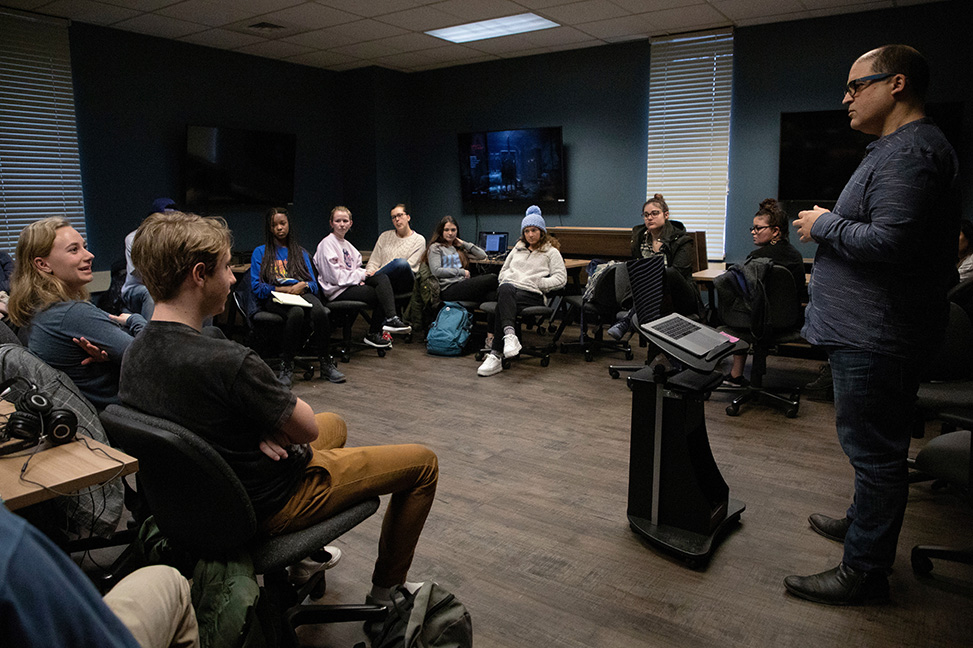 Students participate in a group discussion after playing “Layers of Fear” in Guillermo Rodríguez-Romaguera’s class in the Greenlaw Gameroom. (photo by Megan May)
Students participate in a group discussion after playing “Layers of Fear” in Guillermo Rodríguez-Romaguera’s class in the Greenlaw Gameroom. (photo by Megan May)
Beverly Taylor, who served as the department’s first female chair (from 2008 to 2016) and came to UNC fresh out of graduate school in 1977, said the department is anything but “stodgy.”
“It’s not your grandma’s English major. … We incorporate new writers and issues into our curriculum all the time. I find that very compelling and powerful.”
Not that Shakespeare and Chaucer and Milton and other great writers are ignored. The current department chair, Mary Floyd-Wilson, is in fact a Shakespeare scholar, and Taylor studies Elizabeth Barrett Browning.
In fall 2018, English introduced seven major concentrations. Students can still take a broad-based major, but they may opt to explore more deeply through these “tracks”: British and American literature; comparative and world literatures; creative writing; film studies; science, medicine and literature; social justice and literature; and writing, editing and digital publishing. Many of the major concentrations, including creative writing, which has had a long history in the department, may also be pursued as minors. Due to the department’s growing emphasis on medical humanities, students can now pursue an M.A. in literature, medicine and culture.
And many undergraduate students, according to Floyd-Wilson, choose to “double up” and pick English as a second major.
“We feel good about advising students to double up because we’re bolstering their employment capacity. Businesses and other employers love English majors because they can be plopped down into a complicated situation and they understand how to synthesize the material and be clear communicators,” said Floyd-Wilson, Mann Family Distinguished Professor. (Last year the department hosted a web panel called “How to Succeed in Business with an English Major.”)
But it’s also more than that. Taking English classes enriches students’ lives, the two professors agreed.
“I have a former student who’s now a business attorney who wrote to me many years ago after he was in my class and he said that reading 19th-century novels had saved his sanity,” Taylor said.
A lifelong love of writing
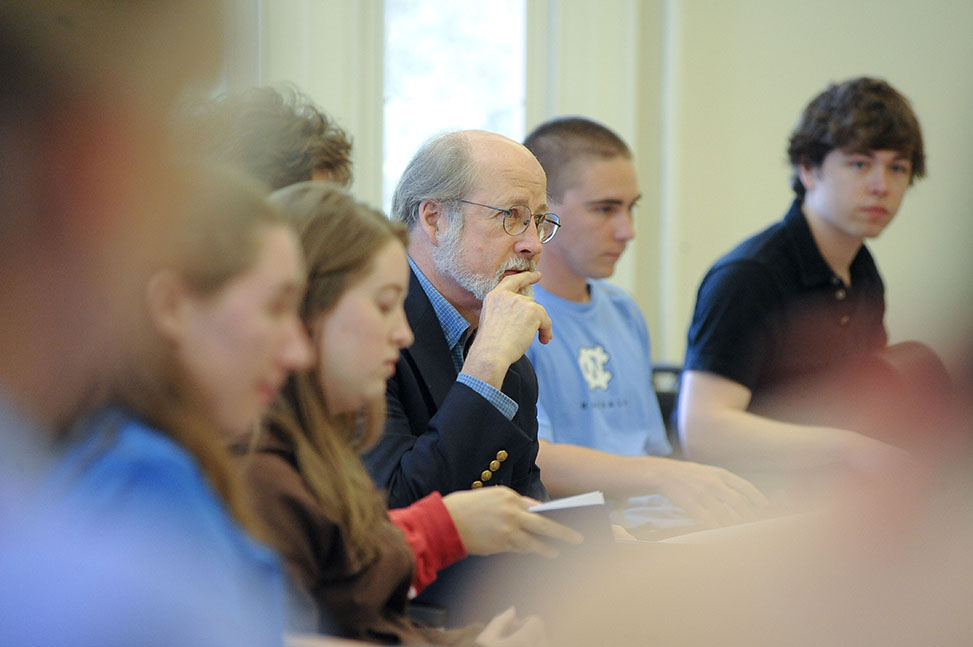 Kenan Distinguished Professor Bland Simpson ’73 has worked to develop an interdisciplinary path in musical writing. (courtesy of UNC-Chapel Hill)
Kenan Distinguished Professor Bland Simpson ’73 has worked to develop an interdisciplinary path in musical writing. (courtesy of UNC-Chapel Hill)
Creative writing traces its history to the hiring of Jesse Rehder in 1947, the first woman to be granted tenure and the rank of associate professor in the department.
Since that time, the department has continued to hire creative writing faculty who have won major state and national awards. Bland Simpson, who graduated from Carolina in 1973, came back to teach creative writing in 1982. He has had various administrative roles over the years, including interim chair of the department and head of the creative writing program. He attributes the secret to the program’s growth and sustainability to “encouragement and a culture of collaboration.” That “collaborative sensibility” continues today.
Because Carolina doesn’t have an MFA program in creative writing, faculty are able to devote all of their energy to the undergraduate program, which is among the best in the country, Simpson said.
“It is a vibrant program. We have so many great teachers, and it’s about taking our students’ work seriously,” said Simpson, Kenan Distinguished Professor. “It is the thing they want the most.”
Simpson, an author, songwriter and longtime member of the Red Clay Ramblers, has worked for years to create an interdisciplinary path in musical writing. Students can now explore those courses in both the creative writing major and minor.
Joanna Pearson remembers fondly her days in the creative writing program. The Shelby, North Carolina, native graduated with highest honors in English and creative writing in 2002, then went on to pursue both an M.F.A in poetry and an M.D. from Johns Hopkins University.
Today she’s both an accomplished author and a practicing psychiatrist in Chapel Hill. She is the 2021 winner of the Drue Heinz Literature Prize, one of the nation’s most prestigious awards. Her collection of short stories, Now You Know It All, will be published by the University of Pittsburgh Press in October.
Pearson is in a writing group today with one of the creative writing students she first met in a senior Honors poetry seminar with Doris Betts Term Professor Michael McFee.
“It’s such an act of generosity for these professors to take undergraduate students seriously and to engage with them as writers and thinkers,” she said. “Within a large university, you have to find that small place that feels like yours. The English department’s creative writing program was my small place.”
***
1795
The University of North Carolina at Chapel Hill begins teaching classes. The curriculum focuses on mathematics and the sciences and requires the study of rhetoric and composition.
1849
Albert Micajah Shipp (1819-1887) is appointed professor of English literature and history, one of the earliest dedicated professorships in English literature in the United States.
1875
The University reopens after Reconstruction with a reformed curriculum that includes a College of Literature.
Sallie Walker Stockard (1869-1963) (pictured at left) becomes the first woman to graduate from the University, receiving a bachelor of arts degree for her thesis, Nature in Poetry.
1901
The department of English is formally established by the Board of Trustees. Professor Charles Alphonso Smith (1864-1924) serves as the first chair.
1914
Edwin A. Greenlaw (1874-1931), considered the founder of the modern department, is appointed chair. Under his tenure, the faculty grew from eight members in 1914 to 37 in 1925.
1920
Thomas Wolfe (1900-1938) graduates from UNC. Look Homeward Angel, his novel detailing his undergraduate experiences, is published in 1927.
Jessie Rehder (1908-1967) (pictured at right) begins a 20-year career teaching creative writing. She became the first woman to be granted tenure and the rank of associate professor in the department.
1969
Blyden Jackson (1910-2000) begins teaching in the department of English. The first tenured black faculty member at UNC, he developed courses in African American and Southern literature.
1970
Greenlaw Hall, named in honor of Edwin A. Greenlaw, is dedicated as the new home of the department of English. Previous homes included Murphey and Bingham halls.
1993
The Morgan Writer-in-Residence Program is established with Shelby Foote (1916-2005) becoming its first visiting writer. Today it is known as the Frank B. Hanes Writer-in-Residence Program.
1999
The department establishes the Thomas Wolfe Prize and Lecture to celebrate “contemporary writers with distinguished bodies of work” and to give the University community “the opportunity to hear important writers of their time.”
2004
The Latina/o Studies Program, the first program of its kind in the Southeast, is inaugurated.
2006
The department of English and the curriculum in comparative literature merge to form the department of English and comparative literature.
Beverly Taylor (1947- ) becomes the first woman to chair the department, an appointment she held for eight years.
2018
The curriculum is redesigned with new major concentrations: British and American literature; comparative and world literatures; creative writing; film studies; science, medicine and literature; social justice and literature; writing, editing and digital publishing.
2021
The department of English and comparative literature celebrates 225 years of “rhetoric, writing, film and literature” at UNC.
For a comprehensive timeline, visit englishcomplit.unc.edu and go to “Read our History.”
***
My time in the department of English
Reflections from October keynote speakers, performers
Register for talks at ecl225.unc.edu.
Frank Bruni, New York Times writer and professor of the practice, Duke University:
“When I think of my time at Carolina, I think of Shakespeare classes with Ann Hall. Dear God, how I loved those classes. Her passion for the subject was palpable and contagious, and the lessons transcended this one nonpareil playwright and poet. Professor Hall taught me how to read patiently, how to respond reverentially and how to feel the joy in language used perfectly. It didn’t just make me a better writer. It made me a better and more fulfilled human being.”
Joseph Terrell, singer/songwriter with Mipso:
“I took Bland Simpson’s first songwriting class in 2010, then I took his second songwriting class followed by an independent study. I think I minored in Bland Simpson. My previous attempts at songwriting had been shots in the dark with rare, inexplicable bullseyes. I didn’t have a process, and I didn’t understand the craft. In Bland’s class, we discussed the particularities of lyric writing — the economy of phrasing, the relationship with melody, the special roles of assonance-as-glue and syncopation-as-playfulness. I loved it. I’d finally found a craft that could make the hours disappear in a kind of trance. By my senior year I knew I wanted to be a songwriter.”
Jill McCorkle, author:
“When I took Max Steele’s beginning fiction writing class, the whole focus of my time at UNC shifted. I felt I had found my true place, a feeling that continued in Lee Smith’s wonderful workshop and then that of Louis Rubin — a brilliant and generous man— who absolutely changed my life. He is the one who told me that I needed to go to graduate school and then advised me every step of the way, and when he founded Algonquin Books, he offered to publish my work and gave my career a beginning. I will always feel very lucky and grateful for those three teachers and the enormous impact they have had on my life.”
By Kim Weaver Spurr ’88
See creative writing program director Daniel Wallace’s illustration for the English 225 celebration in our spring 2021 issue.
Published in the Fall 2021 issue | Features
Read More
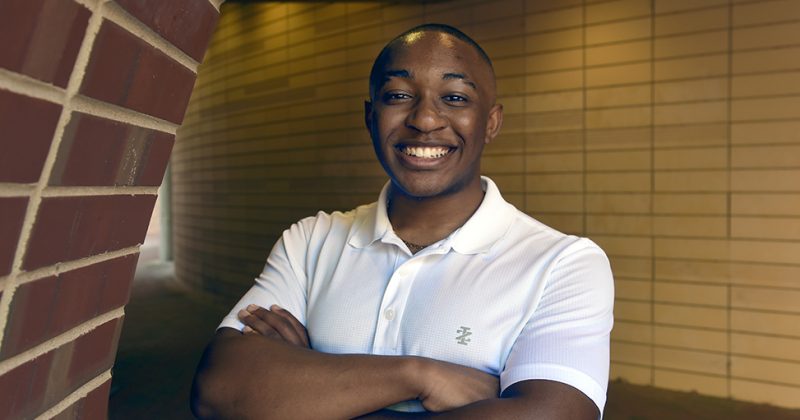
A drive to serve and achieve
Chancellor’s Science Scholar Ryan Smith helps make science and technology…
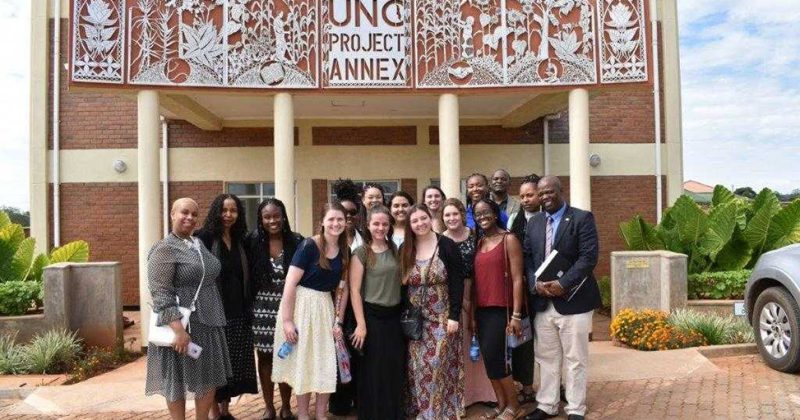
Department of African, African American and diaspora studies celebrates its first endowment
Nicci Gafinowitz ’16 grew up in South Africa and traveled,…
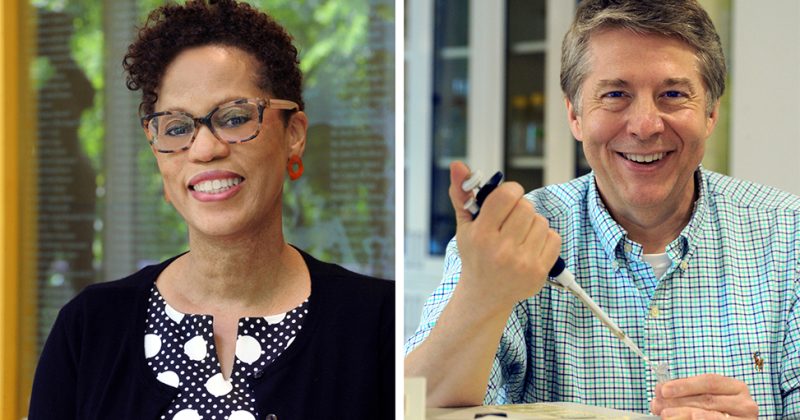
Two new faculty join dean’s senior leadership team
Two new faculty members have joined the dean’s senior leadership…



